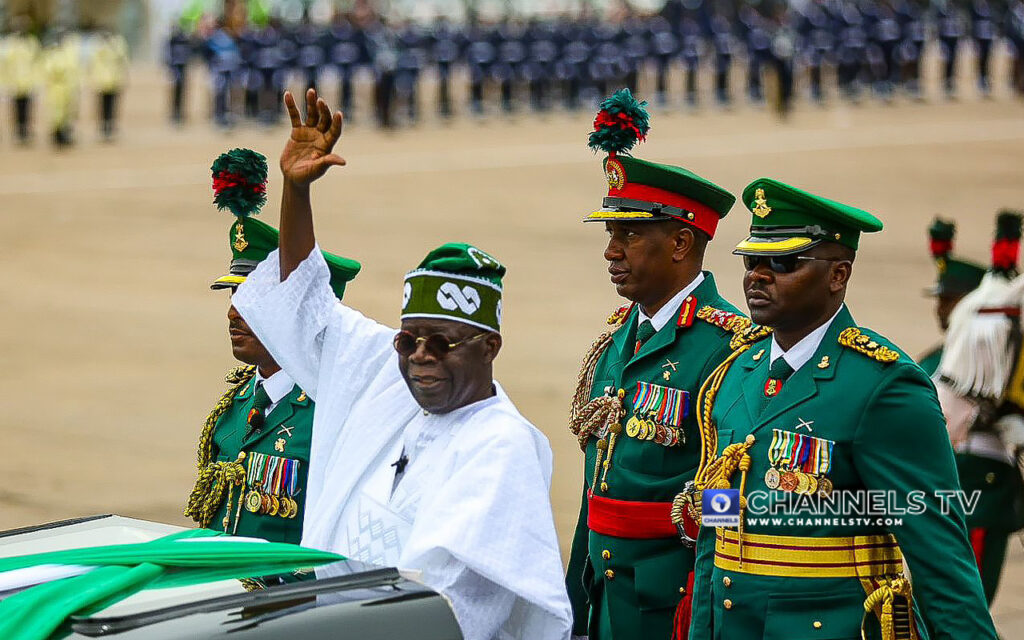By Zion Rufus
Nigeria witnessed a significant moment in its history as President Bola Ahmed Tinubu was inaugurated on May 29, 2023, taking on the role of the nation’s President.
In his first inaugural address titled “The Nigerian Ideal,” President Bola Ahmed Tinubu focused on Nigeria’s potential, unity, and commitment to progress, aiming to dispel doubts about the country’s future.
Expressing his gratitude for the opportunity to serve the nation, President Tinubu outlined his vision for a prosperous and inclusive Nigeria. He acknowledged the strength and resilience of the Nigerian people, recognizing the challenges they have faced and the sacrifices made to reach this pivotal moment in the country’s history.
Tinubu also commended the peaceful transition of power and extended his appreciation to his predecessor, President Muhammadu Buhari, for his dedication to Nigeria. Emphasizing Nigeria’s unity, he positioned the country as a beacon of hope for the Black Race and called for a united march forward.
Transparency and good governance were also key themes in Tinubu’s address.
He pledged to consult and engage in dialogue with the people, promising to never dictate their path. The President expressed his commitment to healing and mending the nation, fostering unity and understanding instead of division.
Acknowledging the recent election’s competitiveness and fairness, Tinubu emphasized the importance of respecting the opposition’s rights to seek legal redress, highlighting the essence of upholding the rule of law. He called for unity among Nigerians, stressing that political affiliations should not overshadow the shared goal of national development.
He also outlined his administration’s priorities, focusing on crucial areas such as security, the economy, job creation, agriculture, infrastructure, and monetary policy. Recognizing the paramount importance of security for prosperity and justice, he pledged to implement reforms in Nigeria’s security doctrine and architecture. This would involve investments in personnel, training, and equipment to effectively combat terrorism and criminality.
In order to stimulate economic growth and reduce unemployment, President Bola Ahmed Tinubu proposed budgetary reforms and industrial policies that promote domestic manufacturing and reduce the country’s dependency on imports. He emphasized the need for accessible and affordable electricity, intending to double power generation while improving transmission and distribution networks. President Tinubu also encouraged states to develop local sources of power generation.
Job creation, particularly in the digital economy, was a significant commitment made by President Tinubu. He aimed to fulfill his campaign promise of creating one million new jobs. To achieve this, the administration plans to work closely with the National Assembly to introduce an omnibus Jobs and Prosperity bill. This bill will focus on promoting labor-intensive infrastructural improvements, fostering growth in light industries, and enhancing social services.
Agriculture received special attention in President Tinubu’s address. He emphasized the importance of securing rural incomes by establishing commodity exchange boards to guarantee fair prices for crops and animal products. The administration also plans to establish nationwide storage facilities and agricultural hubs to increase production and engage in value-added processing. Modern practices and measures to minimize conflicts over land and water resources would be implemented to benefit the livestock sector.
The President also reiterated his commitment to infrastructure development initiated by the previous administration. National networks of roads, rail, and ports would be given priority to enhance transportation and connectivity across the country, promoting economic growth and regional integration.
Monetary policy reforms were also highlighted by President Tinubu, recognizing the need for a unified exchange rate, reduced interest rates, and a review of currency swap policies. These reforms aim to address issues hindering investment and encourage the Central Bank to support the real economy.
Photo: Channels TV/Sodiq Adelakun.






Comment
No comments found.